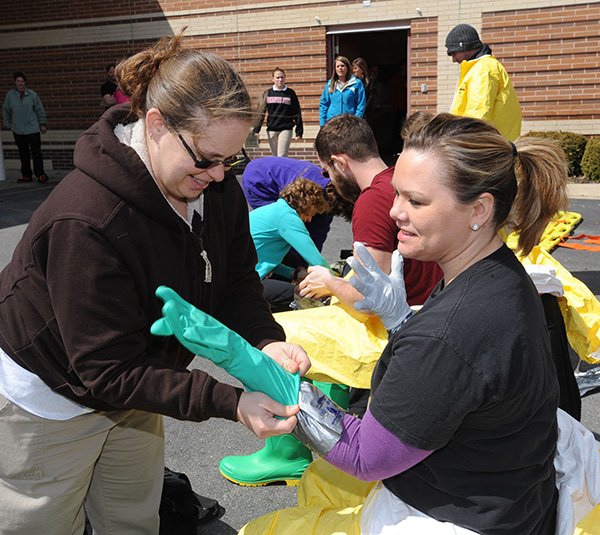Dressed in a bright yellow decontamination suit, Danita Mullins brushed her hair out of her eyes before pulling on a hooded mask connected to an air-supply system on Wednesday.
Mullins, Washington Regional Medical Center assistant emergency room director, was participating in decontamination training at the Fayetteville hospital hosted by Arkansas State University’s Center for Disaster Preparedness.
The workshop was one of 21 decontamination training events that the center plans to hold at hospitals around the state through the end of April, said Deborah Persell, program director for the center. She said the center has an agreement with the Arkansas Department of Healthto provide the training. If the classes reach full registration, up to 630 people could be trained in decontamination techniques.
Decontamination is needed when a person comes in contact with a toxic substance, said Brent Cox, assistant professor of the center. Cox said hospital personnel need to be trained and updated on decontamination best practices regularly. Without proper training, hospitals could expose their patients and staff to toxins, he said.
“If we allow contaminated material into a hospital, we would have to shut the doors,” Cox said. “If we shut our doors then all medical care for the community would be shut down.”
Washington Regional Medical Center has a team of staff members trained todecontaminate patients who come to the hospital with possible exposure to toxins, said Terry Lawson, hospital safety director. He said team members are typically hospital support staff members, including nurses or other medically trained staff as well as security officers and maintenance workers for the hospital.
Mullins is on the hospital’s decontamination team. She said the hospital sees up to seven decontamination cases a year. One person was decontaminated at the hospital last week when a paint truck overturned near Elkins on Arkansas 16.
A chlorine-gas leak at aTyson Foods plant sent more than 150 workers to Northwest Arkansas hospitals for decontamination in 2011. Washington Regional was one of those hospitals, Mullins said.
“Anytime you have a disaster, you have to be prepared,” Mullins said. “This is one of those things that you don’t do very often so you have to train to stay prepared.”
Mullins and four others being trained on Wednesday entered the hospital’s decontamination room. Each wore a yellow suit taped to their boots. They also wore three pairs of gloves and a hooded mask.
A mock patient was then rolled into the room. The team pulled out a hose and a scrub brush. They cut off the mock patient’s clothes andmeticulously started scrubbing.
Cox hoovered near the trainees, offering tips during the training. He mentioned to Lawson that a new hose nozzle could help reduce water splashing.
The common ingredient for decontaminating the patients is Dawn dish soap, Lawson said. He said it has been proven to work.
The decontamination room at Washington Regional is built specifically for reducing or eliminating the risk of toxin exposure to the hospital’s population. One door opens to the outside, another goes to an emergency room hallway and two doors go to patient rooms, Lawson said. The room also has drains in the floor that flow to a water storage tank.
Staff members from other area medical facilities also attended the training, Lawson said, including from Siloam Springs Memorial Hospital, Fayetteville Veterans Administration Medical Center and North Hills Surgery Center.
Funds for the training program come from the state’s Health Care Preparedness Program, said Kerry Krell, spokesman for the Health Department. The state program receives federal funding to help states prepare for disasters and public health emergencies, Krell said.
The state’s program granted more than $2.1 million to health-care coalitions across the state this year, Krell said. She said $85,000 of those funds are set aside for the decontamination training.
Northwest Arkansas, Pages 9 on 03/20/2014

